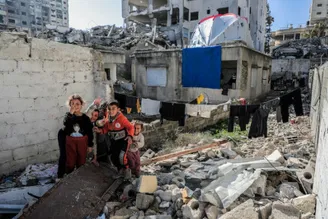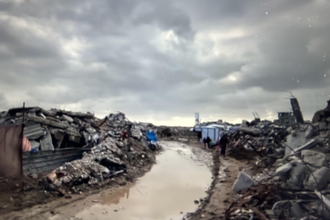US church leaders letter to Harris and Trump campaigns

Source: CMEP
Churches for Middle East Peace Executive Director Rev Dr Mae Elise Cannon have joined 19 other Christian faith leaders in a letter to both Harris and Trump campaigns to express a shared deep concern regarding the ongoing injustice and violations of human rights in Israel/Palestine.
The leaders write: "Even as our primary focus for months has been on calling for an immediate end to the violence in Gaza and throughout Israel/Palestine, we know more must be done by the United States government to work toward a just and permanent solution that addresses the core issues so that international human rights are upheld and the most vulnerable are protected. To that end, we offer the following recommendations for what we feel must be addressed by the next administration in their first 100 days in office."
A full copy of the letter is below.
October 15, 2024
Dear --
We write as US Christian faith leaders deeply concerned by the continuing injustice, suppression of rights, and disregard for international law that has endured for decades in Israel/Palestine. Nearly a year has passed since the escalation in violence on Oct. 7, 2023, between Hamas and the Israeli military. Even as our primary focus for months has been on calling for an immediate end to the violence in Gaza and throughout Israel/Palestine, we know more must be done by the United States government to work toward a just and permanent solution that addresses the core issues so that international human rights are upheld and the most vulnerable are protected. To that end, we offer the following recommendations for what we feel must be addressed by the next administration in their first 100 days in office.
1) Protect Palestinian and Israeli civilian life: A permanent and comprehensive ceasefire is the best way to ensure the well-being of Palestinian and Israeli civilians. Regardless of whether an interim agreement is reached sooner, the next Administration will need to commit to using all its leverage, in the form of diplomatic and military incentives, to press Israel for a bilateral and permanent ceasefire. This is essential to save lives and secure the release of hostages, as well as the release of Palestinian prisoners held without due process of law.
2) Facilitate humanitarian aid: More than two-thirds of Gaza-including tens of thousands of homes, hospitals, schools, and universities-have been destroyed or rendered uninhabitable. Children are dying of malnutrition. Over 200 humanitarian aid workers have been killed in Gaza since October 2023 as a result of Israel's military campaign. In August the first case of polio was reported in a quarter-century in a 10-month-old child. Immediate and unrestricted aid provision and access for the significant and urgently needed humanitarian response is required to affirm the God-given dignity of the people of Gaza and their rights to food, shelter, education, healthcare, and the means to support themselves. In the first 100 days, the United States must do everything in its power to facilitate the delivery of humanitarian aid, including by restoring funding to the United Nations Relief and Works Agency (UNRWA). We also ask that you deploy United States hospital ships, and/or other medical-capable ships, to the waters off Gaza to help provide Palestinian civilians access to emergency medical care.
3) Halt arms sales and military assistance: International human rights organizations, including Amnesty International, have documented how U.S.-provided munitions have been used by Israel to kill civilians in Gaza. The United States government cannot play a proactive role in working to bring a durable and holistic peace to Israel/Palestine while it continues to supply weapons to Israel that are used in contravention of U.S. and international law. The next administration must immediately suspend lethal U.S. arms transfers to Israel in light of repeated apparent violations of international and U.S. law and policy in Gaza and the West Bank.
4) Prioritize regional de-escalation: The ongoing military assault in Gaza has put the entire Middle East under the cloud of a regional war in Lebanon and beyond. More than 60,000 people have been displaced at the northern border of Israel. Close to 500,000 people have been displaced in southern Lebanon as a result of the Israeli military attacks. The United States must work to strengthen our engagement with regional partners to help facilitate diplomatic efforts that will open channels of constructive dialogue and protection of all civilians throughout the region, instead of further entrenching the prospect of regional war.
5) Protect Palestinian Christian communities: The viability of the Palestinian Christian community in both the West Bank and Gaza Strip has been a long-standing trend which has become even greater over the past year. In Gaza, many of the approximately 600 remaining Christians are sheltering in one of two churches in Gaza City with limited access to food, water, and medical supplies. We have grave concerns that the Christian community in Gaza faces the very real threat of complete annihilation and extinction. In Jerusalem and the West Bank, Palestinian Christians face increased violence at the hands of Israeli settlers, as well as severe economic pressures related to the conflict that otherwise threaten their livelihoods. We call for Jerusalem to be a shared city in which Jews, Muslims, and Christians can worship without fear of violence. The United States must also proactively push for Israel to de-escalate the violence, uphold religious freedom and protections for people of all faiths, including the Christian community, which is part and parcel of the Palestinian fabric.
As people of faith and leaders within religious denominations and national organizations, we call for an immediate end to the violence in the Middle East. We pray that whoever is elected President of the United States will demonstrate a robust commitment to the American values of promoting human rights and peace with their words and actions on day one. Thank you for your consideration of this urgent matter, and we look forward to working with you to achieve a just and lasting peace between Israelis and Palestinians.
Sincerely,
Joyce Ajlouny
General Secretary
American Friends Service Committee (AFSC)
Archbishop Vicken Aykazian
Ecumenical Director and Diocesan Legate Diocese
Armenian Church of America, Eastern
United States
Rev. Dr. Mae Elise Cannon
Executive Director
Churches for Middle East Peace (CMEP)
The Most Rev. Michael B. CurryPresiding Bishop and PrimateThe Episcopal Church (TEC)
The Rev. Emmett L. Dunn
Executive Secretary-Treasurer/CEO
Lott Carey Foreign Baptist Mission Convention
The Rev. Elizabeth A. Eaton
Presiding Bishop
Evangelical Lutheran Church in America
Susan Gunn
Director
Maryknoll Office for Global Concerns
Rev. Teresa Hord Owens
General Minister and President
Christian Church (Disciples of Christ) in the United States and Canada
Charlene Howard
Executive Director
Pax Christi USA
Rev. Dr. Gina Jacobs-Strain
General Secretary
American Baptist Churches USA
Bridget Moix
General Secretary
Friends Committee on National Legislation (FCNL)
Bishop Vashti Murphy McKenzie
President and General Secretary
National Council of Churches USA (NCC)
The Rev. Jihyun Oh
Stated Clerk
General Assembly of the Presbyterian Church (U.S.A.)
Dr. David R. Peoples
President
Progressive National Baptist Convention Inc.
Dr. Tyrone S. Pitts
General Secretary Emeritus
Progressive National Baptists Convention Inc
Richard L. Santos
President & CEO
Church World Service (CWS)
Rev. Dr. Karen Georgia Thompson
General Minister and President
United Church of Christ (UCC)
Stephen Veazey
President
Community of Christ
Bishop Hope Morgan Ward
Ecumenical Officer
Council of Bishops, United Methodist Church
Reverend Dr. Elijah R. Zehyoue
Co-Director
Alliance of Baptists
(Formed in 1984, Churches for Middle East Peace (CMEP) is a coalition of more than 30 national church communions and organizations, including Catholic, Orthodox, Protestant, and Evangelical traditions that works to encourage US policies that actively promote a comprehensive resolution to conflicts in the Middle East with a focus on the Israeli-Palestinian Conflict. CMEP works to mobilize US Christians to embrace a holistic perspective and to be advocates of equality, human rights, security, and justice for Israelis, Palestinians, and all people of the Middle East.)


















